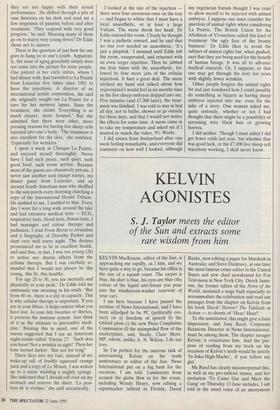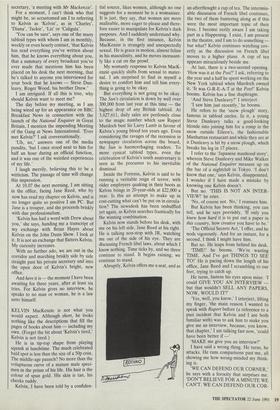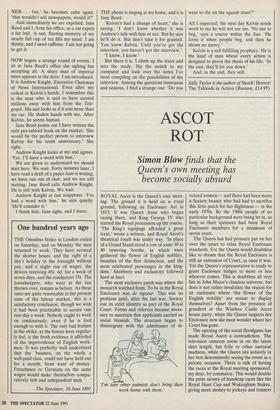KELVIN AGONISTES
S. J. Taylor meets the editor
of the Sun and extracts some rare wisdom from him
KELVIN MacKenzie, editor of the Sun, is approaching me rapidly, as I him, and we have quite a way to go, because his office is the size of a squash court. The carpet is blue, his shirt is blue, his eyes are blue (the colour of the liquid anti-freeze you pour into the windscreen-washer reservoir of your car).
I am here because I have passed the scrutiny of News International, and I have been adjudged to be PC (politically cor- rect) on a) freedom of speech b) the tabloid press c) the new Press Complaints Commission d) the unimpeded flow of the marketplace, and, finally, Clare Short, MP, whom, unlike A. N. Wilson, I do not love.
So I'm perfect for the onerous task of interviewing Kelvin on his tenth anniversary as editor of the Sun. News International put on a big bash for the occasion, I am told. Luminaries from around the globe flew in for the event, including Wendy Henry, now editing a supermarket tabloid in Florida; David Banks, now editing a paper for Murdoch in Australia; and Steve Dunleavy, at one time the most famous crime editor in the United States and now chief newshound for Fox Television in New York City. Derek Jame- son, the former editor of the News of the World, mounted a stage built especially to accommodate the celebration and read out passages from the chapter on Kelvin from his book Shock! Horror! The Tabloids in Action — to shouts of 'Hear! Hear!'
To the uninitiated, this might give a false impression, and Jane Reed, Corporate Relations Director at News International, must be among them. The chapter savages Kelvin; it eviscerates him. And the pur- pose of reading from my book on the occasion of Kelvin's tenth would be strictly 'In-Joke-High-Macho', if you follow my gist.
Ms Reed has clearly misinterpreted this, as well as my pro-tabloid stance, and her invitation `To Come Out and Meet the Gang' on Thursday 13 June includes, I am told in the awed voice of an anonymous secretary, 'a meeting with Mr Mackenzie'.
For a moment, I can't think who that might be, so accustomed am I to referring to Kelvin as 'Kelvin', as in 'Charles', 'Diana', 'Jackie', 'Liz' or 'Caligula'.
'You can be sure', says one of the many tabloid types with whom I am in monthly, weekly or even hourly contact, 'that Kelvin has read everything you've written about him, that he knows everything about you, that a summary of every broadcast you've ever made that mentions him has been placed on his desk the next morning, that he's talked to anyone you interviewed for your book that he knows — Steve Dun- leavy, Roger Wood, his brother Drew.'
I am intrigued. If all this is true, why should Kelvin want to meet me?
The day before my meeting, as I am being wired up for an appearance on BBC Breakfast News in connection with the launch of the National Enquirer in Great Britain, I mention the impending Meeting of the gang at News International. 'Ever met Kelvin?' I ask conversationally.
'IA, no,' answers one of the media pundits, 'but I once stood next to him for half an hour during an official function, and it was one of the weirdest experiences of my life.'
I laugh merrily, believing this to be a witticism. The passage of time will change this impression. At 10.07 the next morning, I am sitting in the office, facing Jane Reed, who by now has read my chapter on Kelvin, and is no longer quite so positive I am PC. But Jane is a trouper, and she proceeds briskly with due professionalism.
'Kelvin has had a word with Drew about you,' she says, handing me a transcript of my exchange with Brian Hayes about Kelvin on the John Dunn Show. I look at it. It is not an exchange that flatters Kelvin. My curiosity increases.
With no further ado, we are out in the corridor and marching briskly side by side straight past his private secretary and into the open door of Kelvin's bright, new office.
And here it is — the moment I have been awaiting for three years, after at least six tries. For Kelvin gives no interview, he speaks to no man or woman, he is a law unto himself.
KELVIN MacKenzie is not what you would expect. Although short, he looks nothing like the descriptions that fill the pages of books about him — including my own. (Forget the bit about 'Kelvin's tired,' Kelvin is not tired.) He is in tip-top shape from playing squash at lunchtime. The much celebrated bald spot is less than the size of a 50p coin. The middle-age paunch? No more than the voluptuous curve of a mature male speci- men in the prime of his life. His hair is the colour of spun gold. His skin is tan, his cheeks ruddy.
Kelvin, I have been told by a confiden- tial source, likes women, although no one suggests for a moment he is a womaniser. It is just, they say, that women are more malleable, more eager to please and there- fore easier to manipulate for Kelvin's dark purposes. And I suddenly understand why. Because, in the first instance, Kelvin MacKenzie is strangely and unexpectedly sexual. He is grace in motion, almost feline in his masculinity, and he moves incessant- ly like a cat on the prowl.
My womanly response to Kelvin MacK- enzie quickly shifts from sexual to mater- nal. I am surprised to find in myself a desire to comfort him and tell him every- thing is going to be okay.
But everything is not going to be okay. The Sun's circulation is down by well over 300,000 from last year at this time — the highest drop of any British tabloid. At 3,627,611, daily sales are perilously close to the magic number which saw Rupert Murdoch bust Sir Larry Lamb in favour of Kelvin's young blood ten years ago. Even considering the ravages of the recession in newspaper circulation across the board, the Sun is haemorrhaging readers. To more cynical tabloid types, even the celebration of Kelvin's tenth anniversary is seen as the precursor to his inevitable dismissal.
Inside the Fortress, Kelvin is said to be running a veritable reign of terror, with older employees quaking in their boots as Kelvin brings in 20-year-olds at £22,000 a year. Is this an attempt to make up in cost-cutting what can't be put on in circula- tion? The newsdesk has been reshuffled yet again, as Kelvin searches frantically for the winning combination.
Kelvin now stands before his desk, with me on his left side, Jane Reed at his right. He is talking non-stop with JR, watching me out of the side of his eye. They are discussing French libel laws, about which I know nothing. Time ticks by, and we three continue to stand. It begins raining; we continue to stand.
Abruptly, Kelvin offers me a seat, and as anafterthought a cup of tea. The intermin- able discussion of French libel continues, the two of them bantering along as if this were the most important topic of their lives. I become eerily aware I am taking part in a Happening. I exist, I am present in the theatre, and I am to do something but what? Kelvin continues watching cov- ertly as the discussion on French libel moves to a higher plane. A cup of tea appears miraculously beside me.
At last, there is a two-second opening. 'How was it at the Post?' I ask, referring to the year and a half he spent working on the New York tabloid when Murdoch owned it. 'It was G-R-E-A-T at the Post!' Kelvin booms. Kelvin has a fine diaphragm.
'And Steve Dunleavy?' I interject.
'I saw him just recently,' he booms.
He refers to the 'snow plough' story, famous in tabloid circles. In it, a young Steve Dunleavy talks a good-looking blonde into joining him for a romp in the snow outside Eileen's, the fashionable Manhattan restaurant and while they are at it Dunleavy is hit by a snow plough, which breaks his leg in 17 places.
I refer to the 'Japanese manhood story', wherein Steve Dunleavy and Mike Walker of the National Enquirer measure up on the bar of a nightclub in Tokyo. 'I don't know that one,' says Kelvin, disappointed. I wonder if I have made a mistake by knowing one Kelvin doesn't.
But no. 'THIS IS NOT AN INTER- VIEW!' he cries.
'No, of course not. No,' I reassure him.
But Kelvin has been thinking, you can tell, and he says peevishly, 'If only you knew how hard it is to put out a paper in this country, how creative you have to be.'
'The Official Secrets Act,' I offer, and he nods vigorously. And for an instant, for a second, I think I might have him.
But no. He leaps from behind his desk.
'TIME!' he booms. 'We're wasting TIME. And I've got THINGS TO SEE TO!' He is pacing down the length of his office, Jane Reed and I scrambling to our feet, trying to catch up.
He turns, fastens his eyes upon mine. 'I could GIVE YOU AN INTERVIEW but that wouldn't SELL ANY PAPERS, NOW, WOULD IT?'
'Yes, well, you know,' I interject, lifting my finger, 'the main reason I wanted to speak with Rupert before (a reference to a past incident that Kelvin and I are both familiar with) was to ask him to make you give me an interview, because, you know, that chapter,' I am talking fast now, 'could have been better if —' 'MAKE me give you an interview?'
I have said a wrong thing. He turns, he attacks. He runs comparisons past me, all showing me how wrong-minded my think- ing is.
'WE CAN DEFEND OUR CORNER,' he says with a ferocity that surprises me. 'DON'T BELIEVE FOR A MINUTE WE CAN'T. WE CAN DEFEND OUR COR- NER . . . but,' he becomes calm again, `that wouldn't sell newspapers, would it?'
And immediately we are expelled, Jane Reed and I, from his office, as a cat expels a fur ball. A sad, fleeting memory of my nearly full cup of tea fills my mind. I am thirsty, and I need caffeine. I am not going to get it.
NOW begins a strange round of events. I sit in Jane Reed's office she sighing but accepting all. A shiny man of imperial mien appears in the door. I am introduced. It is Andrew Knight, Executive Chairman of News International. Even after my ordeal at Kelvin's hands, I remember this is the man who is said to have carried millions away with him from the Tele- graph. His suit looks as if it cost more than my car. He shakes hands with me. After Kelvin, he seems human.
Jane Reed points out I have written the only pre-tabloid book on the market. 'She would be the perfect person to interview Kelvin for his tenth anniversary.' She sighs.
Andrew Knight looks at me and agrees. `Yes. I'll have a word with him.'
We are given to understand we should wait here. We wait. Forty minutes later, I have read a draft of a paper Jane is writing, we have run out of chat, and we are still waiting. Jane Reed calls Andrew Knight. He is still with Kelvin. We wait.
Andrew Knight at last reappears. 'I've had a word with him,' he says quietly. `He'll consider it.'
I thank him, Jane sighs, and I leave. THE phone is ringing at my home, and it is Jane Reed.
`Kelvin's had a change of heart,' she is saying. 'I don't know whether it was Andrew's talk with him or not. But he says he'll do it. But don't take it for granted. You know Kelvin. Until you've got the interview, you haven't got the interview.'
'I know, I know.'
But there it is. I climb up the stairs and into the study, flip the switch to my computer and look over the notes I've been compiling on the possibilities of the interview. Among the questions innocuous and noxious, I find a strange one: 'Do you want to die on the squash court?'
AS I expected, the next day Kelvin sends word to me he will not see me. 'No use to beg,' says a source within the Sun. 'He loves it when people beg, and then he shows no mercy.'
Kelvin is a self-fulfilling prophecy. He is the kind of man whose every action is designed to prove the thesis of his life: 'In the end, they'll let you down.'
And, in the end, they will.
Sally Taylor is the author of Shock! Horror! The Tabloids in Action (Bantam, f14.95)




























































 Previous page
Previous page